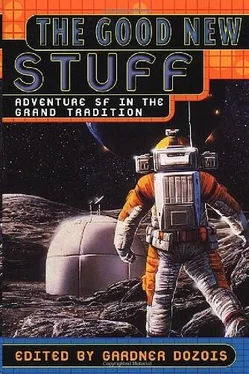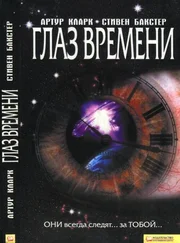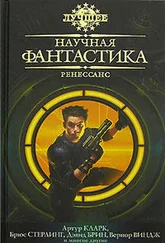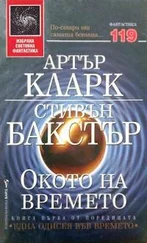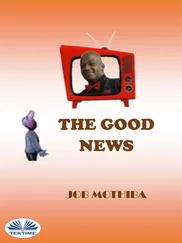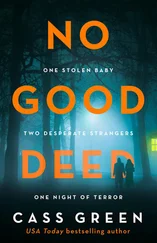Стивен Бакстер - The Good New Stuff
Здесь есть возможность читать онлайн «Стивен Бакстер - The Good New Stuff» весь текст электронной книги совершенно бесплатно (целиком полную версию без сокращений). В некоторых случаях можно слушать аудио, скачать через торрент в формате fb2 и присутствует краткое содержание. Год выпуска: 2002, ISBN: 2002, Издательство: St. Martin's Griffin, Жанр: Фантастика и фэнтези, на английском языке. Описание произведения, (предисловие) а так же отзывы посетителей доступны на портале библиотеки ЛибКат.
- Название:The Good New Stuff
- Автор:
- Издательство:St. Martin's Griffin
- Жанр:
- Год:2002
- ISBN:0-312-26456-9
- Рейтинг книги:3 / 5. Голосов: 1
-
Избранное:Добавить в избранное
- Отзывы:
-
Ваша оценка:
- 60
- 1
- 2
- 3
- 4
- 5
The Good New Stuff: краткое содержание, описание и аннотация
Предлагаем к чтению аннотацию, описание, краткое содержание или предисловие (зависит от того, что написал сам автор книги «The Good New Stuff»). Если вы не нашли необходимую информацию о книге — напишите в комментариях, мы постараемся отыскать её.
The Good New Stuff — читать онлайн бесплатно полную книгу (весь текст) целиком
Ниже представлен текст книги, разбитый по страницам. Система сохранения места последней прочитанной страницы, позволяет с удобством читать онлайн бесплатно книгу «The Good New Stuff», без необходимости каждый раз заново искать на чём Вы остановились. Поставьте закладку, и сможете в любой момент перейти на страницу, на которой закончили чтение.
Интервал:
Закладка:
Pico paused, gazing out at the round-mouthed faces.
So many people and not a breath of sound; and she was having fun. She realized her pleasure almost too late, nearly missing it. Then she told them, "I nearly died," and shrugged her shoulders. "All the distances traveled, every imaginable adventure… and I nearly died on one of our last worlds, doing an ordinary climb…."
Let them appreciate her luck, she decided.
Their luck.
Then another woman lifted her purple flowery hat with both hands, pressing it flush against her own chest. "Of course you survived!" she proclaimed. "You wanted to come home, Pico! You couldn't stand the thought of dying."
Pico nodded without comment, then said, "I was rescued. Obviously." She flexed the damaged leg, saying, "I never really healed," and she touched her hip with reverence, admitting, "We didn't have the resources on board the Kyber. This was the best our medical units could do."
Her mood shifted again, without warning. Suddenly she felt sad to tears, eyes dropping and her mouth clamped shut.
"We worried about you, Pico!"
"All the time, dear!"
"… in our prayers…!"
Voices pulled upon each other, competing to be heard. The faces were smiling and thoroughly sincere. Handsome people, she was thinking. Clean and civilized and older than her by centuries. Some of them were more than a thousand years old.
Look at them! she told herself.
And now she felt fear. Pulling both legs toward her chest, she hugged herself, weeping hard enough to dampen her trouser legs; and her audience said, "But you made it, Pico! You came home! The wonders you've seen, the places you've actually touched… with those hands…. And we're so proud of you! So proud! You've proven your worth a thousand times, Pico! You're made of the very best stuff—!"
— which brought laughter, a great clattering roar of laughter, the joke obviously and apparently tireless.
Even after so long.
They were Pico; Pico was they.
Centuries ago, during the Blossoming, technologies had raced forward at an unprecedented rate. Starships like the Kyber and a functional immortality had allowed the first missions to the distant worlds, and there were some grand adventures. Yet adventure requires some element of danger; exploration has never been a safe enterprise. Despite precautions, there were casualties. People who had lived for centuries died suddenly, oftentimes in stupid accidents; and it was no wonder that after the first wave of missions came a long moratorium. No new starships were built, and no sensible person would have ridden inside even the safest vessel. Why risk yourself? Whatever the benefits, why taunt extinction when you have a choice.
Only recently had a solution been invented. Maybe it was prompted by the call of deep space, though Tyson used to claim, "It's the boredom on Earth that inspired them. That's why they came up with their elaborate scheme."
The near-immortals devised ways of making highly gifted, highly trained crews from themselves. With computers and genetic engineering, groups of people could pool their qualities and create compilation humans. Sixty-three individuals had each donated moneys and their own natures, and Pico was the result. She was a grand and sophisticated average of the group. Her face was a blending of every face; her body was a feminine approximation of their own varied bodies. In a few instances, the engineers had planted synthetic genes— for speed and strength, for example— and her brain had a subtly different architecture. Yet basically Pico was their offspring, a stewlike clone. The second of two clones, she knew. The first clone created had had subtle flaws, and he was painlessly destroyed just before birth.
Pico and Tyson and every other compilation person had been born at adult size. Because she was the second attempt, and behind schedule, Pico was thrown straight into her training. Unlike the other crew members, she had spent only a minimal time with her parents. Her sponsors. Whatever they were calling themselves. That and the long intervening years made it difficult to recognize faces and names. She found herself gazing out at them, believing they were strangers, their tireless smiles hinting at something predatory. The neat white teeth gleamed at her, and she wanted to shiver again, holding the knees closer to her mouth.
Someone suggested opening the lovely gifts.
A good idea. She agreed, and the robots brought down the stacks of boxes, placing them beside and behind her. The presents were a young tradition; when she was leaving Earth, the first compilation people were returning with little souvenirs of their travels. Pico had liked the gesture and had done the same. One after another, she started reading the names inscribed in her own flowing handwriting. Then each person stepped forward, thanking her for the treasure, then greedily unwrapping it, the papers flaring into bright colors as they were bent and twisted and torn, then tossed aside for the robots to collect.
She knew none of these people, and that was wrong. What she should have done, she realized, was go into the Kyber 's records and memorize names and faces. It would have been easy enough, and proper, and she felt guilty for never having made the effort.
It wasn't merely genetics that she shared with these people; she also embodied slivers of their personalities and basic tendencies. Inside Pico's sophisticated womb, the computers had blended together their shrugs and tongue clicks and the distinctive patterns of their speech. She had emerged as an approximation of every one of them; yet why didn't she feel a greater closeness? Why wasn't there a strong, tangible bond here?
Or was there something— only, she wasn't noticing it?
One early gift was a slab of mirrored rock. "From Tween V," she explained. "What it doesn't reflect, it absorbs and reemits later. I kept that particular piece in my own cabin, fixed to the outer wall—"
"Thank you, thank you," gushed the woman.
For an instant, Pico saw herself reflected on the rock. She looked much older than these people. Tired, she thought. Badly weathered. In the cramped starship, they hadn't the tools to revitalize aged flesh, nor had there been the need. Most of the voyage had been spent in cold-sleep. Their waking times, added together, barely exceeded forty years of biological activity.
"Look at this!" the woman shouted, turning and waving her prize at the others. "Isn't it lovely?"
"A shiny rock," teased one voice. "Perfect!"
Yet the woman refused to be anything but impressed. She clasped her prize to her chest and giggled, merging with the crowd and then vanishing.
They look like children, Pico told herself.
At least how she imagined children to appear… unworldly and spoiled, needing care and infinite patience….
She read the next name, and a new woman emerged to collect her gift. "My, what a large box!" She tore at the paper, then the box's lid, then eased her hands into the dunnage of white foam. Pico remembered wrapping this gift— one of the only ones where she was positive of its contents— and she happily watched the smooth, elegant hands pulling free a greasy and knob-faced nut. Then Pico explained:
"It's from the Yult Tree on Proxima Centauri 2." The only member of the species on that strange little world. "If you wish, you can break its dormancy with liquid nitrogen. Then plant it in pure quartz sand, never anything else. Sand, and use red sunlight—"
"I know how to cultivate them," the woman snapped.
There was a sudden silence, uneasy and prolonged.
Finally Pico said, "Well… good…"
"Everyone knows about Yult nuts," the woman explained. "They're practically giving them away at the greeneries now."
Читать дальшеИнтервал:
Закладка:
Похожие книги на «The Good New Stuff»
Представляем Вашему вниманию похожие книги на «The Good New Stuff» списком для выбора. Мы отобрали схожую по названию и смыслу литературу в надежде предоставить читателям больше вариантов отыскать новые, интересные, ещё непрочитанные произведения.
Обсуждение, отзывы о книге «The Good New Stuff» и просто собственные мнения читателей. Оставьте ваши комментарии, напишите, что Вы думаете о произведении, его смысле или главных героях. Укажите что конкретно понравилось, а что нет, и почему Вы так считаете.
